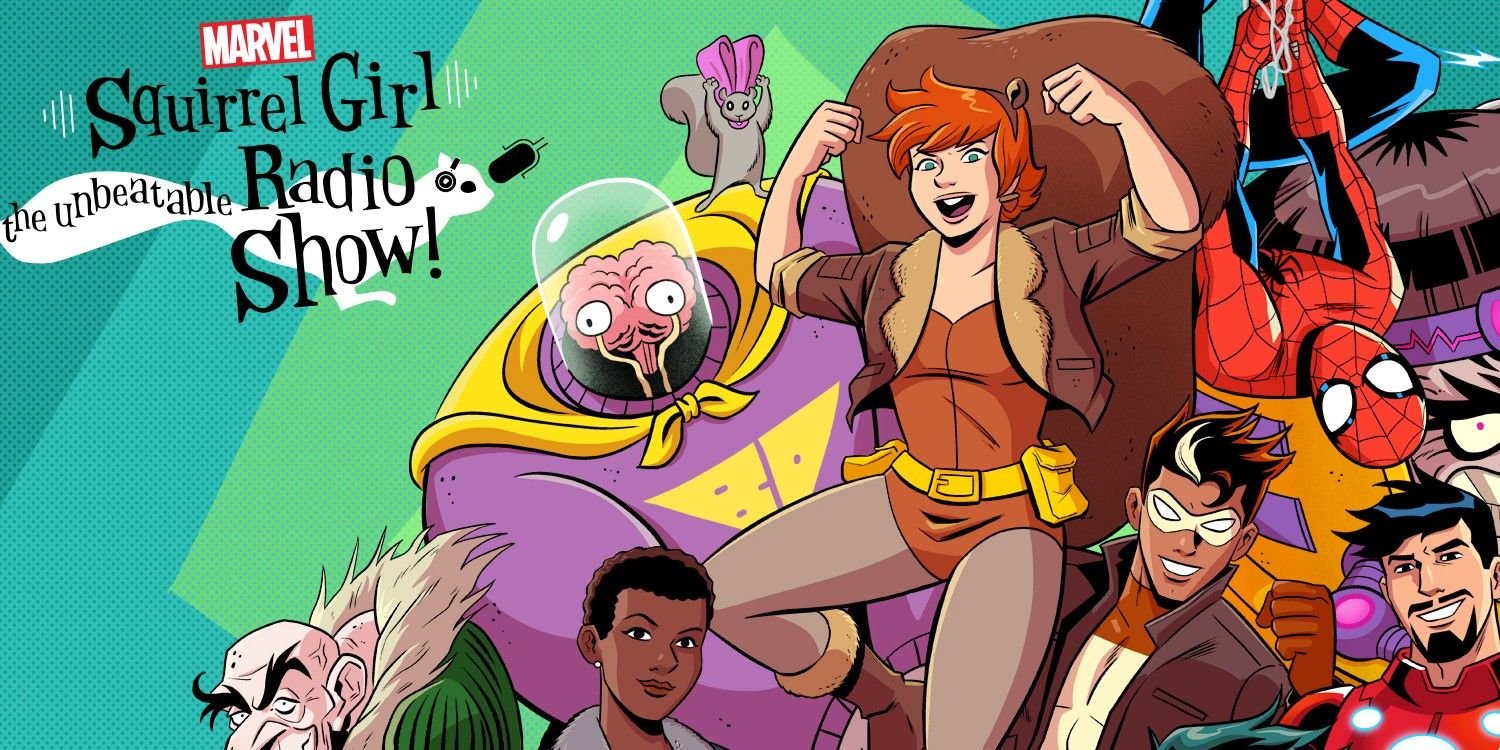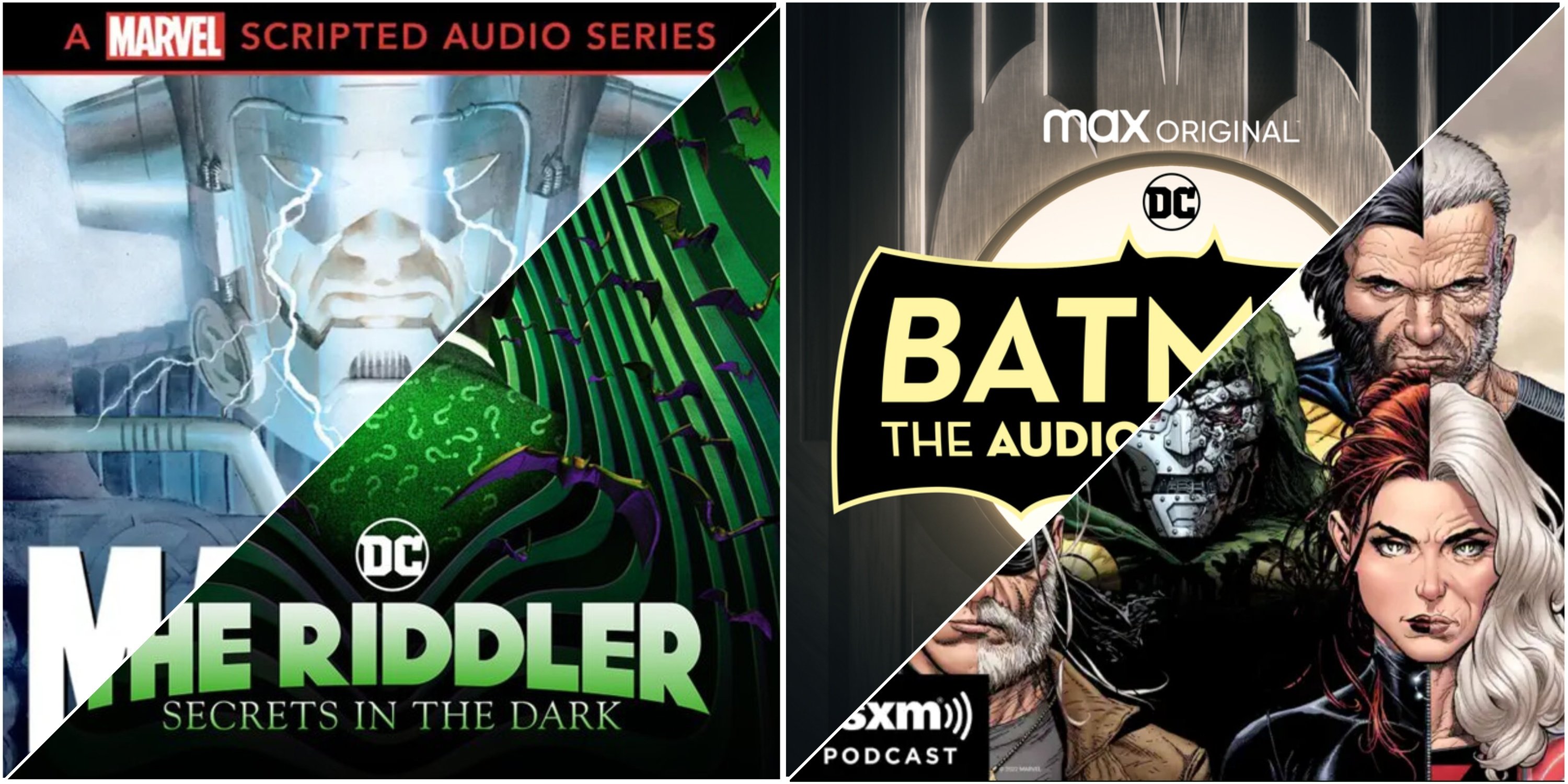Entertainment
Related articles:
As fiction podcasting continues to expand ever outward, it was only inevitable that executives in Hollywood would want a piece of the pie, too. For years now, companies like Audible, Gimlet, Realm, and Wondery have produced celebrity-fronted shows in various genres to varying degrees of quality (and much larger marketing budgets) than the indie shows that first helped launch this community. It should come as no surprise, with their absolute dominance of the pop cultural landscape over the last decade, that Marvel and DC have jumped on the bandwagon as well. But what’s interesting is seeing how different their approaches have been to the medium, both in who they hire to produce their shows and what characters they’ve chosen to follow.
Marvel got the jump on DC by several years, partnering with Sirius XM’s Stitcher Premium to produce Wolverine: The Long Night in 2018. Starring Richard Armitage as the titular mutant, the series played it safe in many ways. Rather than following Wolverine himself, novelist and comic writer Benjamin Percy presents two agents investigating a murder in Alaska, with all signs pointing to his involvement. While the production values were incredibly crisp, and the eventual twist of who the agents are working for extremely satisfying, the series played it safe in many ways in its existence and presentation as a podcast.
In 2019, that same team returned with a second season titled Wolverine: The Lost Trail and improved upon itself in almost every single way. Rather than punting him off to the side in his own show, Percy gives us Wolverine on the trail of a series of lost humans and mutants in New Orleans. By actually allowing the titular character to be the star of his own show, we’re treated as an audience to something that genuinely feels like the mutant story we were promised in the first place. Not only do we follow Wolverine, but we encounter other familiar heroes and mutants that place us squarely within that genre rather than another police procedural.
Arguably the most successful (and interesting) podcast that emerged from Marvel’s foray into the medium is 2020’s Marvels, an adaptation of Kurt Busiek’s landmark 1994 graphic novel. What made this show so special was who the company hired to make it: written by Lauren Shippen of The Bright Sessions, sound designed by Mischa Stanton of ars Paradoxica, and directed by Paul Bae of The Black Tapes, it’s one of the first times where such a massive I.P. was handed over to indie creators. Because of that? This series had more than celebrity stunt casting to draw you in, including one of the most engrossing stories and exciting moments of action sound design ever committed to tape. The series followed Method Man’s Ben Urich as he reported on an ongoing clash between the Fantastic Four and the planet-eater Galactus, who himself sounds utterly terrifying under Stanton’s production.
It wasn’t until 2021 that DC declared its intentions to get into the podcasting game. Following a flashy partnership announcement with Spotify, we’re promised new audio iterations of beloved characters like Batman, Superman, Wonder Woman, and Harley Quinn. At the time, it was an exciting prospect that felt like a no-brainer after Marvel’s continued success, but the world wouldn’t see the fruits of that labor for another year.
In the meantime, Marvel continued their successful partnership with Sirius XM in 2020 by announcing Wastelanders, a six-season experiment set in the same post-apocalyptic world that inspired the 2017 Logan movie. Each season followed a different aged superhero (or villain), with the first premiering in 2021 and starring a grizzled and depressed Star-Lord as he crashes lands on Earth and finds himself up against far more than he bargained for, with the rest of the world’s superheroes either long dead or in hiding. It’s a fun show, written again by Percy, with the fantastic two-some of Timothy Busfield (The West Wing) as Star-Lord and Chris Elliot (Schitt’s Creek) as Rocket Raccoon anchoring our journey across ten episodes.
As with their film and television, Wastelanders took an “everything-is-connected” approach, allowing each subsequent series to leave a trail of breadcrumbs that ultimately came together in its final giant mash-up season, which was released early last year. Hawkeye stars sci-fi favorite Stephen Lang (Avatar) and boasts the writing talents of J. Holtham, who cut his teeth writing for DC’s Supergirl show, as well as The Handmaid’s Tale. It’s an enjoyable series, but not my personal favorite of the bunch, as Marvel leaned here on the safe talent of a Hollywood screenwriter who hadn’t before cut their teeth writing for audio-only.
This trend continues with Black Widow, written by Alex Delyle, with sound design and an original score by Daniel Brunelle. The series starred Susan Sarandon as the titular spy hero, as she infiltrated The Onar, a dystopian high-security building in New York City. While this show relied heavily on the audio delivery of this story in the narrative, it was exciting for that to be presented as hidden surveillance microphones throughout The Onar rather than another detective’s recorded notes on a criminal investigation. That said, it’s another case where the titular Black Widow was more of a secondary character, as the series instead followed Lisa Cartwright, a new employee tasked with listening in on all of the building’s residents.
Marvel took a break from Wastelanders with 2022’s Squirrel Girl: The Unbeatable Radio Show, which saw the return of Ryan North to writing the character, and the first official appearance of Milana Vayntrub as the character after the TV show New Warriors was shelved mid-production. Release-wise, this move raised eyebrows as Marvel took a hard left turn from a post-apocalyptic wasteland into the quirky drama of a college radio show. That being said, Vayntrub was clearly a natural fit in the role as he knows and loves Squirrel Girl more than any other creator.
 At this point, DC finally entered the game with the premiere of its first co-production with Spotify Studios, Batman Unburied. Produced in-house through a collaboration between Blue Ribbon Content, the arm of Warner Brothers responsible for DC’s beloved animation slate, and the people who once made up Gimlet Media, this was an incredibly lush-sounding series starring Winston Duke as Batman, Gina Rodriguez as Barbara Gordon (pre-Batgirl), and Hasahn Minaj as The Riddler. With a star-studded ensemble cast of side characters, including podcast royalty the McElroy brothers, and a story created by longtime Batman scribe David Goyer, it’s a strong introduction into the medium for the studio. While the casting choices were legitimately inspired, and the score was engaging, there were moments throughout for me where the background foley was mixed far too loud and distracted from the story that was meant to be followed.
At this point, DC finally entered the game with the premiere of its first co-production with Spotify Studios, Batman Unburied. Produced in-house through a collaboration between Blue Ribbon Content, the arm of Warner Brothers responsible for DC’s beloved animation slate, and the people who once made up Gimlet Media, this was an incredibly lush-sounding series starring Winston Duke as Batman, Gina Rodriguez as Barbara Gordon (pre-Batgirl), and Hasahn Minaj as The Riddler. With a star-studded ensemble cast of side characters, including podcast royalty the McElroy brothers, and a story created by longtime Batman scribe David Goyer, it’s a strong introduction into the medium for the studio. While the casting choices were legitimately inspired, and the score was engaging, there were moments throughout for me where the background foley was mixed far too loud and distracted from the story that was meant to be followed.
At this point, Marvel’s Wastelanders: Wolverine, which followed Squirrel Girl, was a triumphant return to form for the publisher. Rather than continuing with another Hollywood writer, they teamed with Jenny Turner Hall of the long-beloved kid’s mystery podcast, The Unexplainable Disappearance of Mars Patel. Turner Hall brought us a Wolverine who was at the absolute end of his rope, played beautifully by Terminator’s Robert Patrick. What I particularly loved about this series was how much it leaned into the source material of the original Old Man Logan comics it was based on.
This, to me, was a huge turning point for the rest of the Wastelanders series. Especially because, immediately after Wolverine, we saw the premiere of Doctor Doom, a series that relied on the writing talents of James Kim of Moonface fame. Kim excels at writing wildly personal stories, and witnessing those strengths applied to the superhero medium was an absolute joy. Dylan Baker (Spider-Man 2) brought the appropriate gravitas to the titular role, infusing an almost Shakespearean quality to his delivery.
Rather than follow Batman Unburied immediately with another gritty, boots-on-the-ground procedural, DC instead premiered Batman: The Audio Adventures. Another collaboration between Blue Ribbon and Spotify, this series starred Jeffrey Wright as Batman but harkened further back to the zany style of West’s 60’s Batman rather than Bale’s gravelly superhero. The cast was rounded out by a huge stable of SNL stars and bit players, and it wasn’t for me. While I’m glad to see DC embrace humor in its storytelling, there were moments throughout when I felt more like I was listening to a sketch comedy show than a scripted drama, which wasn’t what I was looking for.
In 2023, we saw the end of Marvel’s collaboration with Sirius XM with the final Wastelanders series. An Avengers-style mashup, which marked the return of Star-Lord, Hawkeye, Black Widow, Wolverine, Doctor Doom, and the other disparate heroes they’d collected along the way to cap off a wild three years of storytelling. In the writer's room, J. Holtham from Hawkeye returned, along with Fear the Walking Dead’s Nick Bernadone and legendary comics writer Mark Waid. It was entertaining, and I was glad to see all of those elements finally coming together, but this installment never reached quite the same highs as either Wolverine or Doctor Doom did on their own when working with audio veterans like Turner Hall and Kim.
Conversely, the beginning of 2023 saw DC’s first collaboration with Realm Media, Harley Quinn and the Joker. Starring Christina Ricci and Billy Magnussen, this show got so many things right from the get-go. Written by Eli Horowitz, creator of Gimlet’s landmark Homecoming series and produced by the legendary Fred Greenhalgh of The Dark Tome, who himself was no stranger to working in IP, I had a hard time stopping this show after pressing play. A unique, feminist take on the antihero that allowed her to be pulling the strings the whole time rather than blindly following the Joker, this series leaned on the manic energy that Ricci developed for her role as Misty on the Showtime series Yellowjackets.
That collaboration with Realm also saw the premiere of the Max Greenfield-starring The Flash: Escape the Midnight Circus and a return to the world of Batman Unburied with The Riddler: Secrets in the Dark. While I couldn’t imagine a more perfect casting choice than Schmidt from New Girl as Barry Allen, this show was sort of buried amongst all of the controversy surrounding the long-battled Flash film. The Riddler, on the other hand, smartly chose to showcase Minaj’s incredible take on the character, although they swapped out Duke for Colman Domingo when it came to Batman.
We’ve now seen the world’s two biggest comics publishers go all in on the medium, to varying results. While Marvel didn’t always trust indie creators with its toybox, it spent years developing its voice before DC entered the game. While I hazard to say that any one of these podcasts could hold its own against the magic of The Bright Sessions or Welcome to Night Vale, I applaud the studios for recognizing an emerging community and trying their best to engage with it.
That being said, I have a hard time giving Marvel or DC any credit at all after the last year of their unwillingness to negotiate in good faith with striking actors and writers, shelving completed projects for tax write-offs, and unfortunately, in Marvel’s case, laying off half of the team that shepherded their scripted podcast wing through its five years of existence, not to mention what will happen with DC once James Gunn officially becomes to the keeper of their entire canon. I doubt it’ll be the end of either studio’s spending in the space. Still, it's unfortunate to see such rich storytelling cast aside in favor of bloated executive pay and increased subscriber numbers.
Some indie creators might see this failure to nurture our growing industry as a reason to celebrate; as we continue to outnumber the majors regarding actual audience engagement, I can’t help but mourn. How else are we supposed to continue to hone our crafts if there aren’t any larger entities around willing to give us the proper funding to do so? Hopefully, this is just a blip, and a theoretically improved economic circumstance will ramp spending back up so that more creators like Shippen, Stanton, Turner Hall, Kim, and Greenhalgh will get a chance to play in their sandbox. Lord knows we deserve it.

